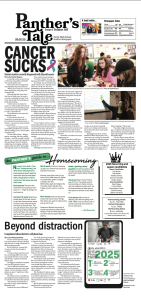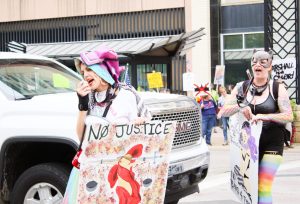Microaggressions harm people of color
December 15, 2021
Five students stood around a single computer at a journalism work night in November, airing their frustrations. Different races, different backgrounds, all sick and tired of microaggressions.
“It’s so annoying when people try to touch my hair,” said junior Agness Mbezi, who is Black.
“Or when they ask if I’m really Black and they compare my skin tone to theirs,” added junior Cooper Chadwick, who is Black and White.
Microaggressions are subtle jabs, often passed off as jokes.
And they’re draining
You dress too white.
You are so well-spoken.
“You kind of just feel lost and belittled in a way, so it’s just a really small thing that creates a big impact on the way you think and the way you start wanting to change the way you act and look to other people,” said senior Janeah Berry, who is Black and Asian.
Psychiatrist Chester M. Pierce first introduced the term in the 1970s, and it has become popularized as more attention is drawn to microaggressions.
“I came from a really diverse school,” said senior Janeah Berry, who is Black and Asian, and transferred to Derby as a sophomore. “Everybody just didn’t really have a problem with race or anything like it was never really such a big thing to talk about coming here like hearing random kids yelling the n-word knowing they’re not Black. It really just reminds me that racism didn’t start as far back as we think and it’s still a big problem that we need to take care of.”
The comments are so casually said that people of color are expected to brush it off. To take it as a joke.
In a school that is 65.9% white, these comments are detrimental to students of color, who hear it on a daily basis.
You look so exotic.
Why are your eyes shaped like that?
“It is so bad and just because the school is majority white,” said junior Chloe Palivan, who is Thai. “It’s honestly just seen as a joke, and as people of color, we’re expected to just take it as a joke and to not take it seriously and just let it slide.”
You talk too loud. Laugh too loud.
Do you go by an easier to pronounce name?
It all grates on junior Mia Davis, and because of the microaggressions, she admits to being more standoffish.
“I don’t really talk to a lot of people for that reason because I don’t want to hear it,” Davis said. “… Just don’t ask stupid questions. There is Google for a reason. I feel like it’s kind of like, ‘what am I supposed to say?’ Don’t ask people to touch their hair. That’s so weird.”
You only wash your hair once a week?
Why does your food smell like that?
Being aware of what is and isn’t a microaggression is simple – listen.
“If somebody that is a person of color is telling you that what you’re doing or what you’re saying is making them uncomfortable, then that is something you really need to think about,” Berry said. “Stop trying to say, ‘oh my gosh, why is everything about race?’… Be more aware and be just more open to be educated and not think that you always have to be right.”





